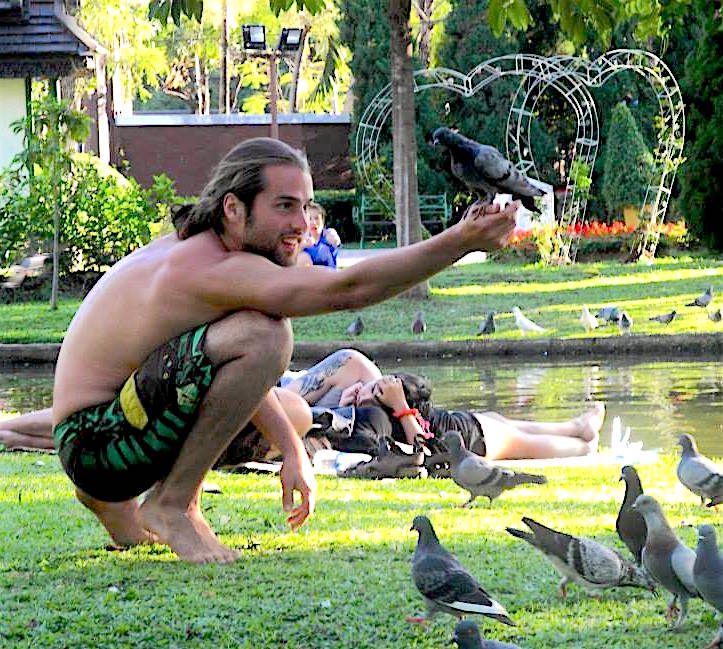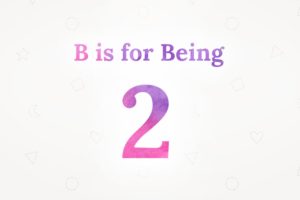A look at some of the tools (and challenges) for developing a healthy sense of self-worth.

Tim’s life is flowing with creativity, authentic relationships, and expansive personal growth that’s taking place at an exponential rate.
The first time I met Tim I was blown away by his solid sense of Self and I noticed he wasn’t looking to anyone to see how he should act or what he should do next; he was simply and completely just being himself.
During our conversation I discovered Tim hasn’t always lived a life of such grounded flow. He experienced a big shift in his life at age 14 and then again at the age of 18. With the help of some powerful self-discovery tools he began a conscious journey into himself to release blocked emotional energy and became aware of his limiting beliefs and genuine needs.
There’s a lot of heartfelt sharing in this episode. I share some of the fears I’ve encountered on my own journey to self-expression, and Tim shares the tools he’s used to create the enriching and dynamic life which is unfolding before him everyday.
Show Highlights and Takeaways
How Do You Comfort Yourself?
- Tim: I found some tools at the beginning of my journey and they’re still helping me. They were part of a big life change for me (The Four Agreements, Non-Violent Communication and The Relationship Triangle.)
- One of The Four Agreements is Don’t take anything personally. I’m not looking for confirmation or external-validation. In this way I’m not dependent on people finding me good enough, interesting enough or genuine enough. I try to provide this self-worth for myself.
- I have a really good relationship with myself. I’m my own really good buddy. And I respect myself as I would do with a really good friend.
- The relationship I have with myself is vibrant and authentic. And this relationship has welcomed me through the experiences along my journey.
- Non-violent communication was also a big tool. It’s helped me understand my needs and how I express them.
- These tools have allowed me to feel happy, content, genuine and confident. I play with all three of these tools.
How Do You Have an Authentic Connection With Yourself?
- Tim: Being aware of my needs and how to satisfy them in a healthy and direct way. Not looking for people to satisfy what I’m looking for.
- I also have boundaries. There are some things I won’t accept and won’t let other people do to me. It’s how I value myself and what do I accept from myself and others.
- Being aware of my needs and setting up boundaries. In this healthy space I have enough room to feel free to do what I want in a respectful way, in a way which is respectful to myself and others. Allowing the space for my feelings. If I feel sad it’s fine and I’ll allow myself to cry if I need to.
- I welcome myself as much as possible, in an unconditional way. Love without conditions.
How Do You Become Aware of Your Needs Without a Sense of Your Self?
- Ben: I remember when I had such low self-worth that a sense of Self felt non-existent. I didn’t have any concept of myself at all. It was very hard to even begin to understand what my needs were when I didn’t even know there was a self inside me to listen to.
- Tim: Feelings. How do you feel? If you felt lost or non-existent — that’s a feeling. Ask yourself what the feeling is related to, what are you looking for? By digging down using Step 2 (identifying your feelings) and Step 3 (becoming aware of your needs), over time you will go deeper and deeper and connect the main root – connecting your feelings with your genuine needs.
- When you become aware of what’s going on (inside you) you are digging with your consciousness through the unawareness of all those things. It’s darkness by default because you are unconscious of them.
- The more room you’re making to allow yourself to be, the more life is taking place in your life and the more powerful your changes and new decisions will be.
- The last 7 or 8 years of working my life more consciously has been amazing. It’s been a crazy exponential. If I’d met my past self 10 years ago I would never believe the life I have now and the way I’m living it.
Feeling Unworthy to Feel Good
- Ben: I remember a time when I didn’t even feel I was worth giving myself space and time. I couldn’t even allow myself to feel the feelings I was having because I didn’t feel I deserved to feel good or receive love.
- Tim: I would invite you to try the Non-Violent Communication tool to observe what’s happening (inside you) and why.
Self-Worth and Feeling Worthy to Receive
- Ben: I have moved many blocks from my life by just being my best friend and allowing myself the space to feel how I feel. But I’m still struggling with how worthy I feel to receive from other people – love, affection, gifts. There’s still a part of me that doesn’t feel 100% worthy of receiving.
- Tim: I really enjoy offering things coming from this beautiful kind inner space. I’m happy to give things. But why am I struggling to receive things? Why am I blocking this beautiful flow of life? And then I would look at it using the tools I mentioned before (The Four Agreements, Non-Violent Communication). What beliefs do I have? Why do I believe I’m not worth it? What should I do, according to this belief, to be worthy of receiving? What are the conditions?
- Making space for The Four Agreements in your life will gradually erase the old agreements you have with yourself: ‘I deserve love if I do this’, ‘I will provide myself with what I need once I achieve this.’
Fear of Changing ‘Too Much’ and Being Abandoned by Our Family
- Ben: I was afraid that if I changed too much they would abandoned me.
- But now that I’ve made some big changes in my life I can see they still love me. I can see that there is an unconditional love there that goes beyond my family’s conditioned past.
- It’s comforting for me to know that no matter how much I change I’ll still be accepted.
- Tim: Maybe for some people the family won’t be able to welcome you through your changes. That may be another challenge on the journey. But the family is much bigger than just the blood family. The family is big. I meet brothers and sisters everywhere. We are part of the same family.
- Ben: If our family doesn’t know how to deal with the changes we’re going through we’re not dependent on them being ok with our changes or not. That’s a beautiful thing because it takes the pressure off of specific people to accept us in order to feel loved and worthy.
Why Does Feeling Good Start With Self-Worth?
- Ben: Why is it that self-worth comes first. Why do we first need to start with ourselves before we begin to experience positive changes in our life and feel a part of the larger human family?
- Tim: When we are pointing out something we don’t like about something or someone else we have three (maybe four?) fingers pointing back at us.
- How can I have an authentic relationship with others without being myself and welcoming myself. You can’t save someone who’s drowning if you don’t first know how to swim.
- I’m experiencing my own movie. I’m the main character in my movie. It doesn’t meant that I need all the attention but it’s my movie. I want to be a happy, genuine character in my movie.
Mentioned in this Episode
Tim’s YouTube Channel – TimTim sur la route des Fruits
The Four Agreements by don Miguel Ruiz
- Be Impeccable with your Word – Speak with integrity. Say only what you mean. Avoid using the Word to speak against yourself or to gossip about others. Use the power of your Word in the direction of truth and love.
- Don’t Take Anything Personally – Nothing others do is because of you. What others say and do is a projection of their own reality, their own dream. When you are immune to the opinions and actions of others, you won’t be the victim of needless suffering.
- Don’t Make Assumptions – Find the courage to ask questions and to express what you really want. Communicate with others as clearly as you can to avoid misunderstandings, sadness and drama. With just this one agreement, you can completely transform your life.
- Always Do Your Best – Your best is going to change from moment to moment; it will be different when you are healthy as opposed to sick. Under any circumstance, simply do your best, and you will avoid self-judgment, self-abuse, and regret.
Non-Violent Communication consists of four steps (via Wikipedia)
- Observation – What are the facts of a situation separate from our evaluation or interpretations.
- Feelings – What are the emotions or sensations we are experiencing, free from the thoughts and stories we have about the event. (I feel angry, I feel misunderstood, etc.)
- Needs – Becoming aware of what our genuine needs are, separate from our strategies of meeting those needs.
- Request – A request for a specific action, free of demand. Requests are distinguished from demands in that one is open to hearing a response of “no” without this triggering an attempt to force the matter.
The Relationship Triangle (a.k.a. Karpman’s Drama Triangle)
The different roles we can jump to in the Relationship Triangle:
- Victim – The Victim’s stance is “Poor me!” The Victim feels victimised, oppressed, helpless, hopeless, powerless, ashamed, and seems unable to make decisions, solve problems, take pleasure in life, or achieve insight. The Victim, if not being persecuted, will seek out a Persecutor and also a Rescuer who will save the day but also perpetuate the Victim’s negative feelings.
- Saviour (or Rescuer) – The rescuer’s line is “Let me help you.” A classic enabler, the Rescuer feels guilty if he/she doesn’t go to the rescue. Yet his/her rescuing has negative effects: It keeps the Victim dependent and gives the Victim permission to fail. The rewards derived from this rescue role are that the focus is taken off of the rescuer. When he/she focuses their energy on someone else, it enables them to ignore their own anxiety and issues. This rescue role is also very pivotal because their actual primary interest is really an avoidance of their own problems disguised as concern for the victim’s needs.
- Persecutor – The Persecutor insists, “It’s all your fault.” The Persecutor is controlling, blaming, critical, oppressive, angry, authoritative, rigid, and superior.








